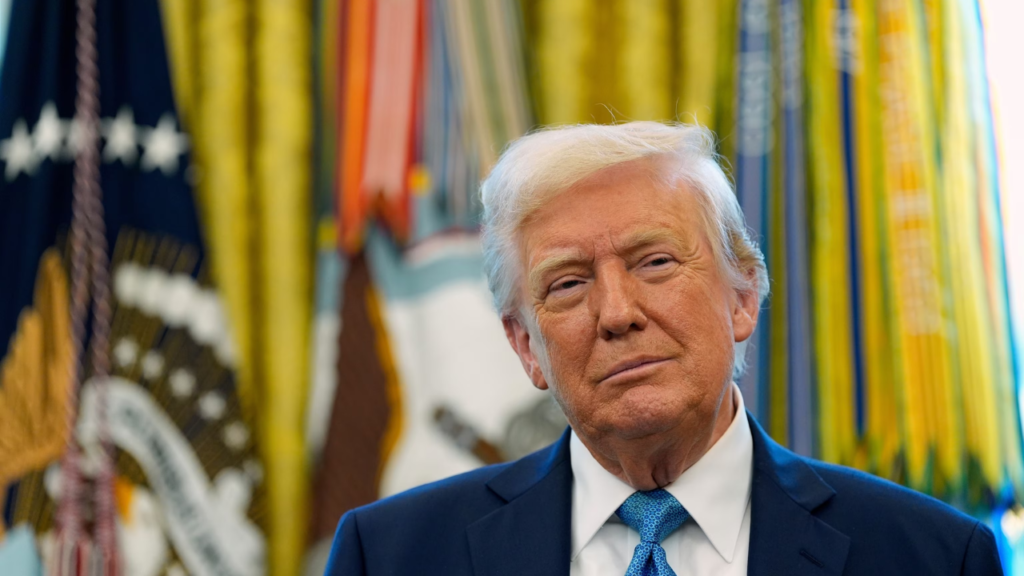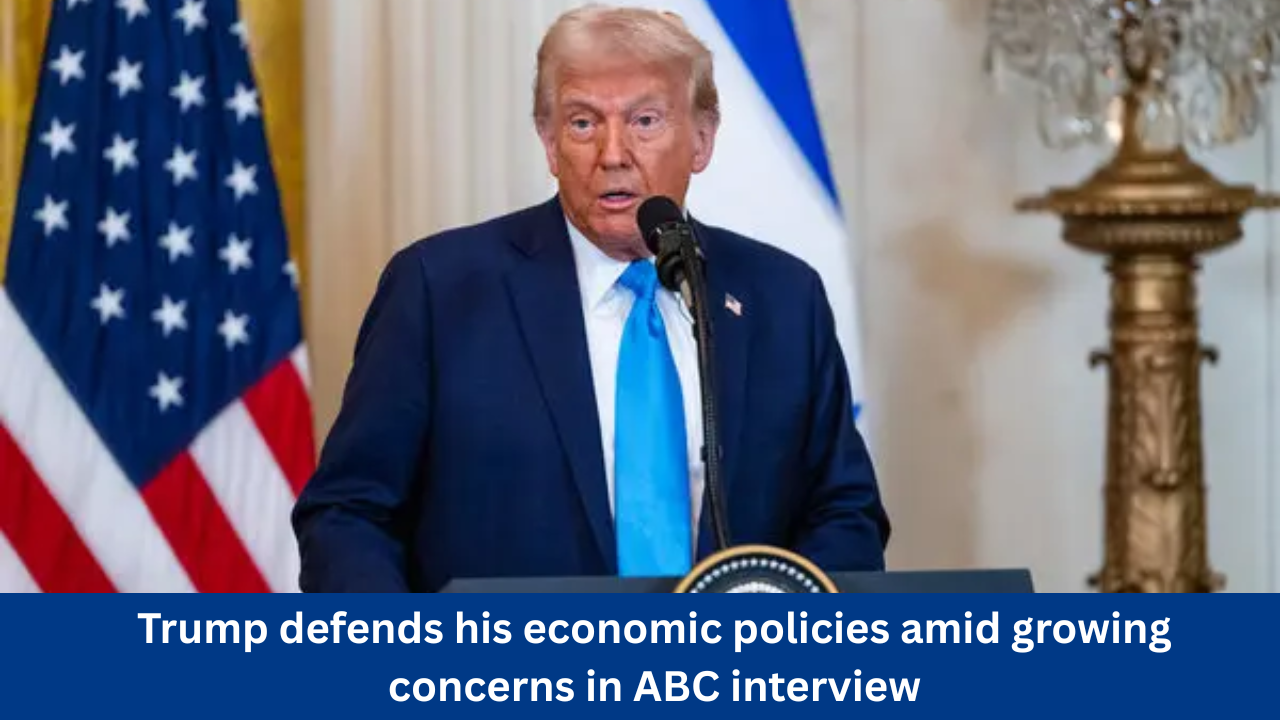In a recent exclusive interview with ABC News, former President Donald Trump sought to calm rising concerns over the state of the U.S. economy, particularly amidst fears related to his administration’s trade policies and the potential for a recession. The interview, marking a key moment in Trump’s return to the political spotlight, was filled with assertions about his economic vision, including defense of controversial tariff policies and a reassessment of America’s foreign trade relationships.
Tariffs and Trade Imbalances
One of the main points of contention in the interview was Trump’s aggressive stance on trade, particularly with China. During his tenure, Trump imposed tariffs on Chinese imports, a move that sparked a wide range of reactions. The former president continued to defend these tariffs, which, in some cases, were as high as 145%. Trump argued that these measures were necessary to correct what he saw as decades of trade imbalances where the U.S. had been “ripped off” by countries around the world.
When asked about the impact of these tariffs, Trump was unapologetic, asserting that China would bear the brunt of the financial burden. “China will probably eat those tariffs,” Trump stated, confident that these economic pressure points would eventually yield favorable results for the United States. Despite acknowledging that the U.S. might face a “transition period” as the new policies take effect, Trump remained optimistic about the long-term benefits.
“I said all of these things during my campaign. I said, ‘You’re gonna have a transition period,'” he added, signaling that short-term difficulties should be expected but were part of a broader strategy to rebuild America’s economic power. U.S. Trade Representative
Economic Concerns and Public Sentiment

Despite Trump’s reassurances, the U.S. economy has shown signs of strain in recent years, and public sentiment has largely reflected this unease. According to recent polls, over 70% of Americans believe the country is in a poor economic state. Factors contributing to this pessimism include rising consumer prices, persistent inflation, and growing concerns about a potential recession. Many critics argue that the tariffs, while addressing long-standing trade imbalances, could exacerbate these problems by driving up costs for American businesses and consumers.
The tariffs have led to a sharp rise in prices for various goods, which is felt particularly in industries reliant on imports from China. This has created a backlash from businesses that argue the increased costs will ultimately be passed on to consumers. Economists also warn that such trade wars can have a lasting impact on global supply chains, which could further complicate efforts to stabilize prices.
Trump’s Optimism and Economic Outlook
Despite these concerns, Trump remains steadfast in his belief that the U.S. economy is poised for a major rebound. He predicted “great times ahead” for the country, citing his previous successes in office. Trump has long touted the economic growth during his administration, pointing to tax cuts and deregulation as key factors that contributed to low unemployment and rising stock market numbers prior to the COVID-19 pandemic.
“The policies that we put in place were working,” Trump said. “And we’re going to get back to that again.” He went on to argue that the U.S. had been facing unfair competition from abroad for too long and that his tough stance on trade would ultimately benefit American workers, particularly in industries like manufacturing, where the U.S. has struggled to remain competitive.
However, Trump’s critics remain wary of these claims. Many economic experts caution that a full recovery might be more complicated than Trump suggests, especially if the administration’s policies continue to alienate major trading partners. Some fear that the long-term economic damage caused by the tariffs could be difficult to reverse, especially given the interconnectedness of the global economy.
Polls and Public Perception
As public discontent grows, Trump’s policies continue to face scrutiny. A significant number of Americans express doubts about the effectiveness of tariffs, with many wondering if the benefits of Trump’s trade war with China are worth the economic pain. According to the latest polling data, Americans are particularly concerned about rising prices for goods, especially consumer staples, and the potential for the tariffs to spark a full-blown recession.
This sentiment underscores a key challenge for the former president as he looks to reassert his leadership in American politics. Despite his strong support base, which remains loyal to his vision of an “America First” economic policy, broader public opinion appears to be more cautious. Many Americans are eager to see concrete signs of recovery and may be hesitant to embrace a trade policy that, while bold, has introduced a great deal of economic uncertainty.
Immigration and Foreign Affairs
Beyond economics, Trump’s interview also touched on other major topics, such as immigration and foreign policy. Trump reiterated his administration’s focus on mass deportations, a cornerstone of his approach to illegal immigration. He expressed confidence that his interpretation of the law had led to meaningful achievements in curbing illegal immigration and vowed to continue this approach if given another opportunity in office.
In terms of foreign relations, Trump was less definitive, particularly regarding U.S. support for Ukraine in its ongoing conflict with Russia. While he acknowledged that his influence had deterred a full-scale Russian invasion, he refrained from committing to continued military support for Ukraine. This position, which has generated mixed reactions, illustrates Trump’s ongoing strategy of strategic ambiguity in foreign policy.
Conclusion
Trump’s comments in the ABC News interview reflect his continued commitment to the policies that defined his first term. While he defended his approach to trade and the economy, the growing anxiety among the public and rising concerns over inflation and tariffs suggest that his message may face significant challenges. With mid-term elections looming and the potential for another presidential bid in 2024, Trump will need to address these concerns if he hopes to maintain his political relevance and regain the trust of the broader American public.
For further reading on U.S. trade policies, the official U.S. Trade Representative website offers insights into the current administration’s stance on trade agreements and tariff policies. Similarly, for details on federal economic statistics, the U.S. Bureau of Economic Analysis provides comprehensive data on national income and output.

Pankaj Kumar is a skilled content writer at OTE News, focusing on breaking news, technology, and socio-political developments. With a background in Mass Communication, he brings a balanced perspective to his articles, ensuring clarity and reliability. Pankaj has a knack for simplifying complex topics for readers.
In his free time, he enjoys photography, traveling, and experimenting with new cuisines. His curiosity and dedication to truthful reporting make him a valuable contributor to OTE News.




